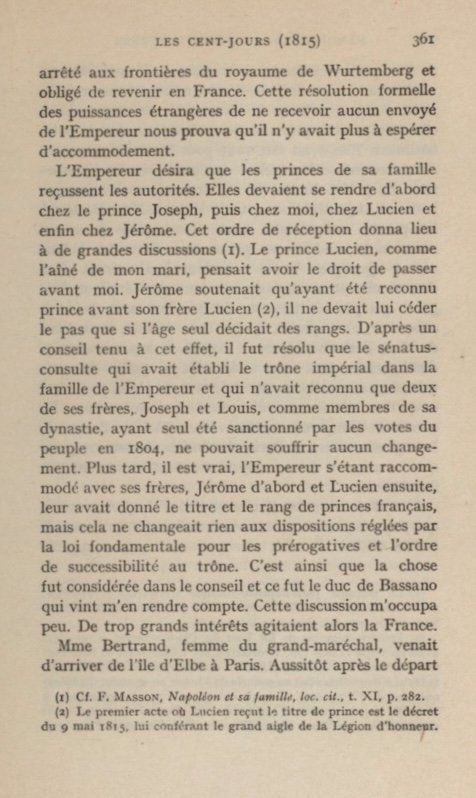Let’s have another look at Hortense’s Memoirs. If you want to read the book it is available for free at the side bar in English and French. Use the widget on the sidebar to translate the text below into pretty much any language.
The sovereignty of France, the desire of the French people to be ruled by Napoleon played no role in the thoughts of Napoleon’s enemies. This is proven by how they ALL as one entity refused to communicate with him or acknowledge his right to rule a nation who revered him.
Hortense’s memoirs continues:
When he left he seemed deeply stirred. I returned to Paris in his carriage because mine was not ready, and the Grand Marshal [Bertrand] accompanied us. The Emperor read official documents all the way and did not say a word to us. When we arrived at the Tuileries, we found Monsieur de Flahaut, who had just mentioned Monsieur de Talleyrand. "I knew for a long time that he was deceiving me, but I never thought he would go as far as he did. I treated him as I should have treated a gossipy old woman and let him keep on talking without paying attention to what he said."
On our return to the château the newspapers were brought to him. He had me read aloud his letter to Marshal Grouchy, printed by the Moniteur, in which he instructed the Marshal to protect the departure of the Comte d'Artois, who had just been arrested in the south of France.
He seemed satisfied by this act of magnanimity and our approval. Monsieur Molé said to me privately: "His letter is all very well, but I wish he had not insisted upon the return of the crown jewels. It would have been better not to ask for anything."
When we arrived at the Tuileries we found Monsieur de Flahaut, who had just come back from his mission of delivering messages to the Emperor of Austria and Empress Marie Louise. He had not been able to reach Vienna, but had been stopped at the frontier of the Kingdom of Württemberg and obliged to return to France.
This formal refusal on the part of the foreign powers to receive any communication from the Emperor proved that we could not hope to reach any understanding with them.
The Emperor wished the princes who belonged to his family to receive the formal visit of the various government officials. They were supposed to call first on Joseph, then on me, then on Lucien and finally on Jerome. This order of precedence provoked violent family dissensions.
Prince Lucien being older than my husband considered he should come before me. Jerome insisted that having been made prince before his brother Lucien received this title, he should follow him only if age alone was made the basis for this precedence. After a special family council to discuss the matter it was agreed that the senatorial decree (senatus-consultum), which placed the Emperor's family on the throne and recognized only two of his brothers, Joseph and Louis, as members of his dynasty, having been approved by the popular vote in 1804, could not undergo any modification.
To be sure, the Emperor had afterwards become reconciled with his other brothers, Jerome first and then Lucien. He had conferred on them the title of Prince of France, but this did not alter in any way the provisions of the original law regarding the prerogatives of the various members of his family or the order of succession to the throne.
This was the decision that the cabinet council arrived at, and it was the Duc de Bassano who came to inform me of it. I confess it did not interest me particularly. Other far more important things were happening in France.
Madame Bertrand, the wife of the Grand Marshal, had just arrived in Paris from Elba. Following her husband's departure and that of the Emperor she felt she could not be separated from the Grand Marshal and, without regard for any danger, obeying only her impulse, she and her children had sailed on board of a very small vessel.
They had intended to land at Marseilles before even having had word how the Emperor's expedition had succeeded. When they landed, the city was still under the authority of the King's prefet, while the Duc d’Angoulême held a portion of southern France.
Madame Bertrand received outrageous treatment. Without respect for her sex she was marched off to prison by guards carrying fixed bayonets. Several high officials dared declare in her presence and that of her children that her husband was a common highway robber who would shortly be executed.
What seems still more incredible was that her brother-in-law Monsieur de La Tour du Pin, who was indebted to her for many favors, was at that time in Marseilles acting as special royal commissioner and did nothing to help her although possessing full authority to do so.
The Emperor's successes restored Madame Bertrand to liberty. When she arrived at Paris, she insisted that those who had been responsible for her imprisonment should not be molested.
It was from Comtesse Bertrand and the Emperor himself that I heard a number of details about his life while on Elba. He had a little estate there in the country called Saint-Martin which he used to ride out to daily, but this was not enough to satisfy his taste for activity.
His lodgings were most uncomfortable, but he did not complain. Frequently in the evening he would play vingt et un (21) or dominoes.
The original French is available below:





